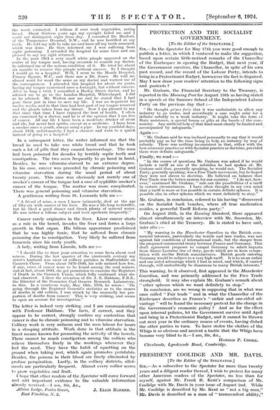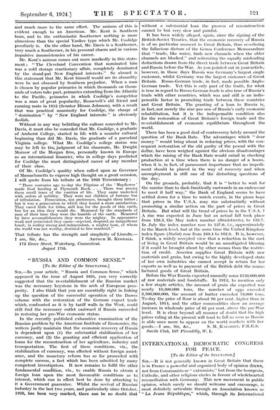PRESIDENT COOLIDGE AND MR. DAVIS.
[To the Editor of the SPECTATOR.] SIR,—As a subscriber to the Spectator for more than twenty years and a diligent reader thereof, I wish to protest for many other American readers of the Spectator, no less than for myself, against Mr. Frank R. Kent's comparison of Mr. Coolidge with Mr. Davis in your issue of August 2nd. While Mr. Coolidge is described by Mr. Kent as " not a big man,."' Mr. Davis is described as a man of " transcendent ability,",
and much more to the same effect. The animus of this is evident enough to an American. Mr. Kent is Southern born, and to the enthusiastic Southerner nothing is more obnoxious than the special Yankee type which Mr. Coolidge peculiarly is. On the other hand, Mr. Davis is a Southerner, very much a Southerner, in his personal charm and in various impulsive inconsistencies of his career. Mr. Kent's animus comes out more markedly in this state- ment : " The Cleveland Convention that nominated him was a cold storage reactionary affair, completely dominated by the stand-pat New England interests." So absurd is this statement that Mr. Kent himself would see its absurdity were he not obsessed by Southern prejudice. When a man is chosen by popular primaries in which thousands on thous- ands of voters take part, primaries extending from the Atlantic to the Pacific, primaries in which Coolidge's competitor was a man of great popularity, Roosevelt's old friend and running mate in 1912 (Senator Hiram Johnson), with a result that was practical unanimity for Coolidge, the charge of " domination " by " New England interests " is obviously foolish.
Without in any way belittling the culture conceded to Mr.
Davis, it must also be conceded that Mr. Coolidge, a graduate of Amherst College, started in life with a sounder cultural beginning than did Mr. Davis, the graduate of a parochial Virginia college. What Mr. Coolidge's college status was may be left to the. judgment of his classmate, Mr. Dwight Morrow of the Morgan firm, personally known in Europe as an international financier, who in college days predicted for Coolidge the most distinguished career of any member of their class.
Of Mr. Coolidge's quality when called upon as Governor of Massachusetts to express high thought on a great occasion, will quote from his tribute at the 1920 Tercentenary :
" Three centuries ago to-day the Pilgrims of the ' Mayflower' made final landing at Plymouth Rock.. . . There was among them small trace of the vanities of life. They came undecked with orders of nobility. They were not children of fortune but of tribulation. Persecution, not preference, brought them hither ; but it was a persecution in which they found a stern satisfaction. They cared little for titles, still less for the goods of this earth, but for an idea they would die. Measured by the standards of men of their time they were the humble of the earth. Measured by later accomplishments they were the mighty. In appearance weak and persecuted they came—rejected, despised, an insignificant band; in reality strong and independent, a mighty host, of whom the world was not worthy, destined to free mankind."
That tribute has the strength and simplicity of Lincoln.—







































 Previous page
Previous page